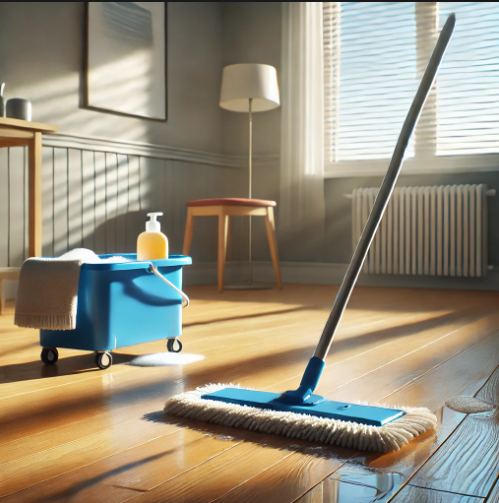
Commercial properties frequently use natural stones like granite, marble, and terrazzo.
However, compared to the typical tile, they are far more porous and contain more bacteria because they are natural goods. For this reason, floor cleaning experts advise yearly cleaning and sealing of your natural stone surface.
Let’s discuss in detail…
Natural Stone Floor Cleaning Mistakes to Avoid
Regular care and good maintenance are necessary to keep your stone looking beautiful for many decades to come. They will maintain their luster and brilliance if you do this.
For the majority of natural stones utilized by natural stone cleaning companies, general upkeep and cleaning equipment are rather comparable. However, natural stone has a variety of physical and chemical characteristics. This implies that each need particular attention.
What would happen if you didn’t know enough about cleaning natural stone? Commercial property owners may make mistakes as a result, which could cause harm to the stone.
1. Using Harsh Products
It is very forbidden to use abrasive or harsh cleaning agents on the surface of your natural stone. Instead of cleaning your stone, these chemicals can etch it, discolor it, remove sealants, and eventually cause harm.
Although vinegar is frequently suggested as a natural substitute, its acidity can harm the sealant and cause stains to appear. Brick-acid is a cleaning solution that is frequently suggested.
While it works well on concrete and other surfaces, it can oxidize the iron minerals in natural stone. This shows up on your stone as brown or orange stains.
2. Don’t Put Off Cleaning Natural Stone Spills
Delays in spill cleanup are among the most frequent errors that can result in natural stone damage. A staining agent is more likely to be absorbed by your natural stone surface the longer it is left on it.
This might result in chemical reactions like etching, staining, or the opening of porous stones to moisture. Major problems like mold development or cracking might result from trapped moisture. Spills should always be cleaned up as quickly as possible.
3. Applying an Abrasive Instrument
Many people think that a scrubbing pad is the best tool for removing stains and scratches. And a little elbow grease. However, if you do this for natural stone cleaning, the stone will probably decay more quickly.
This is due to the abrasive effect that a cleaning pad has on stone. Avoid the temptation to “buff” any stains or scratches; instead, use a gentle cotton cloth and a mild solution.
An etched stone can only be repaired by sharpening it and then restoring it.
4. Neglecting Stone-Specific Care
Natural stone comes in a variety of forms, including granite, slate, sandstone, and limestone, each of which needs special maintenance.
For example, because limestone is most susceptible to acid-based cleansers, it is most likely to sustain inadvertent damage. As such, more care needs to be taken to ensure that it is cleaned with non-acidic chemicals.
To avoid needless damage, it’s crucial to utilize cleaning solutions designed specifically for real stone.
5. Not Guarding Areas with A Lot of Foot Traffic
High foot traffic on stone surfaces wears down the stone over time. The stone will appear dull as a result of this alteration in appearance.
It is therefore advised to use runners, rugs, and doormats. Put them in places where a lot of people walk through your property, including the corridors.
6. Using Too Much Water
Overuse of water when cleaning can cause discoloration and eventually structural damage by soaking into the pores of natural stone.
Mistakenly, some people think that soaking the stone in water can help remove dirt and grime, but this might have unintended consequences.
When washing surfaces made of natural stone, use as little water as possible. To get rid of dirt and stains, moisten a soft cloth or mop with water and a mild stone cleanser, then gently wipe the surface.
In order to stop water from soaking into the stone, dry the surface right away with a fresh cloth.
7. Neglecting Routine Maintenance
Dirt, filth, and stains can accumulate on your natural stone if you neglect routine upkeep. For example, if black spot is left untreated, it will grow roots deeper into the stone’s pores and become more difficult to remove.
Using a patio cleanser that contains biocide will make this easy to handle. By doing this, the blackspot will be killed and its roots will be removed from the stone, making removal simple.
Establish a regular cleaning schedule to avoid accumulation of filth and long-term harm. Maintain the beauty of your stone for many years to come.
8. Not Sealing Your Stone Frequently
Sealing is advised for many stones as part of their routine upkeep and treatment. Property owners might feel pressured to attempt DIY stone sealing. However, only a reputable natural stone cleaning firm should seal your stone for optimal results.
You should have your stones sealed within three to five years on average. However, the sealing might need to be done once a year in places with significant foot traffic and windows that receive a lot of sunshine.
Wrap Up
After assessing the natural stone, floor cleaning professionals apply tried-and-true cleaning agents that effectively remove oil and grime.
The experts thoroughly remove scratches and other wear and tear using cutting-edge equipment, polish the stone’s surface, and then seal it to prevent further discoloration. They constantly go above and above the industry standard in their approach!





Leave a Reply